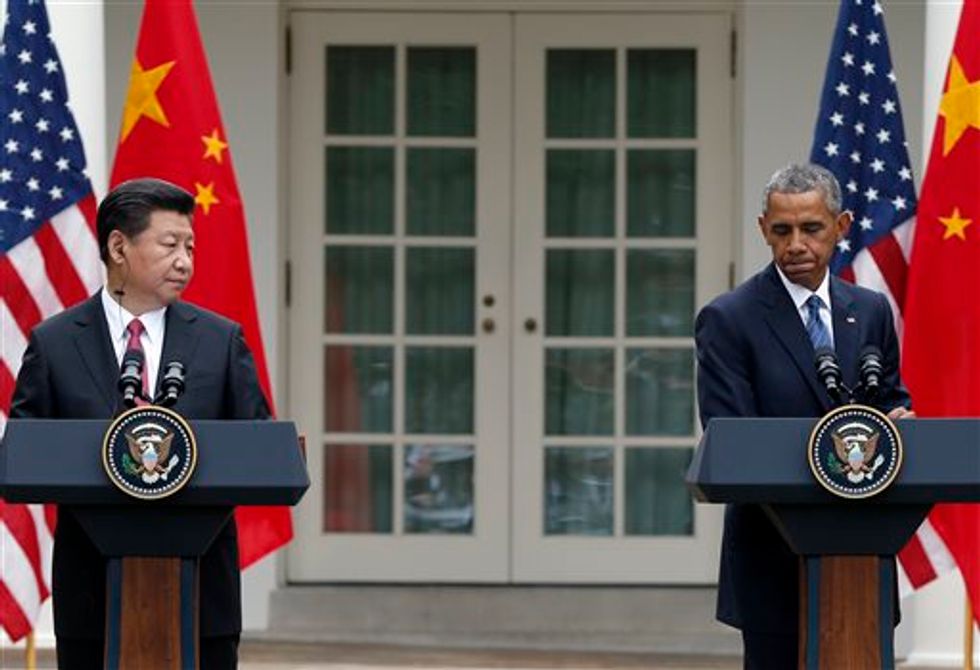Chinese President Xi Jinping's public crackdown on corruption has captivated Western media, leading to sensational stories like recent reports that golf club membership is among the newly announced list of prohibited activities for Communist Party members. The ongoing anti-corruption effort could have significant impact for the United States given the close economic ties between our two nations. Unfortunately, it is likely to prove more show than substance unless officials get serious about addressing the corruption's root causes.
China's 11-million-worker government is rife with corruption. One estimate suggests it might cost the Chinese economy as much as 3 percent of GDP, or roughly $200 billion, per year. None of this should come as much surprise given the nature of the country's political system. The sort of concentrated political power that characterizes communism is a breeding ground for graft and corruption.
 Chinese President Xi Jinping (Getty Images)
Chinese President Xi Jinping (Getty Images)
When Xi took office in 2012, he warned that unchecked corruption would threaten the Communist Party's continued rule and, in the years, since has orchestrated a crackdown that has seen thousands of officials rounded up. While his efforts have made a big media splash, they give little cause for optimism at the prospect of lasting change.
Rather than address the root causes of corruption, the ruling Communist Party is reverting to old patterns of top-down control. Almost all of the cases have been pursued by the Party's Discipline and Inspection Commission rather than through legal structures. Officials who confess get lighter sentences, while those who refuse face longer terms and even the prospect of torture.
Many of those pursued have included high-profile political officials, such as senior Party official Bo Xilai and former Politburo Standing Committee member Zhou YongKang; a heavy focus has also been placed on military officials. These arrests, however flashy, ignore the rampant corruption squeezing out foreign businesses in the Chinese market.
State business regulator Sun Hongzhi, former vice minister of the State Administration for Industry and Commerce responsible for investigating U.S. companies like Microsoft, Qualcomm and Chrysler under anti-monopoly laws, is one exception: He was arrested earlier this year on charges of bribery and embezzlement. No similar arrests were made in notoriously corrupt Shanghai, where Illinois-based OSI Group’s factory was raided last July under trumped up charges and sensationalized media claims. Without addressing commercial corruption at the local and provincial levels, President Xi and the Chinese Communist Party are treating the symptoms and not the disease.
Chinese corruption is not limited to party bigwigs but rather permeates society. Parents pay bribes to get children into prestigious universities. Workers take kickbacks to award company contracts. Business rarely is conducted without some such greasing of the wheels.
The depth of the problem illustrates the tensions inherent in trying to liberalize markets without adopting similar changes in political and legal systems. And the absence of the kinds of protections taken for granted in Western nations has left China's economic future uncertain. So in spite of the high-profile crackdown, confidence from both within and from outside the Chinese economy is eroding, and in turn foreign direct investment into the Chinese economy is slowing.
A Chinese slowdown will reverberate throughout the U.S. economy. It constitutes both a major market for American-owned multinational businesses, as well as a primary source of goods that raise the standard of living in the U.S. Numerous sectors, including oil and gas, steel, gambling and auto manufacturing, are heavily exposed to the Chinese economy.
In opting to rely on Communist Party mechanisms rather than rule of law to combat its corruption problem, China's ongoing campaign is likely to fall victim to the same tendencies, such as political abuse and exploitation for personal gain, that created the problem in the first place. To protect domestic economic interests, administration officials should press harder for key reforms that move China further away from its command-and-control roots and toward a freer society built upon the robust rule of law.
–
TheBlaze contributor channel supports an open discourse on a range of views. The opinions expressed in this channel are solely those of each individual author.


 Chinese President Xi Jinping (Getty Images)
Chinese President Xi Jinping (Getty Images)


